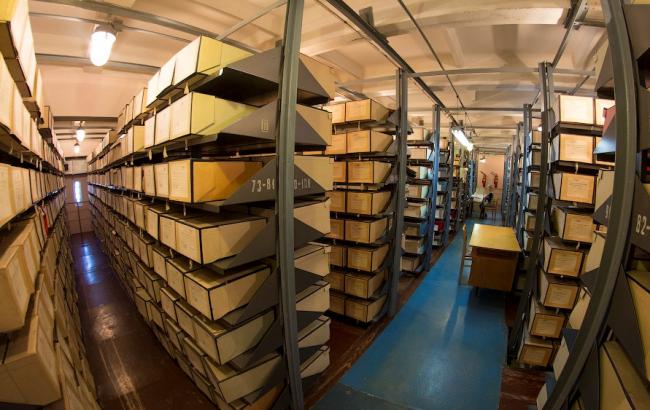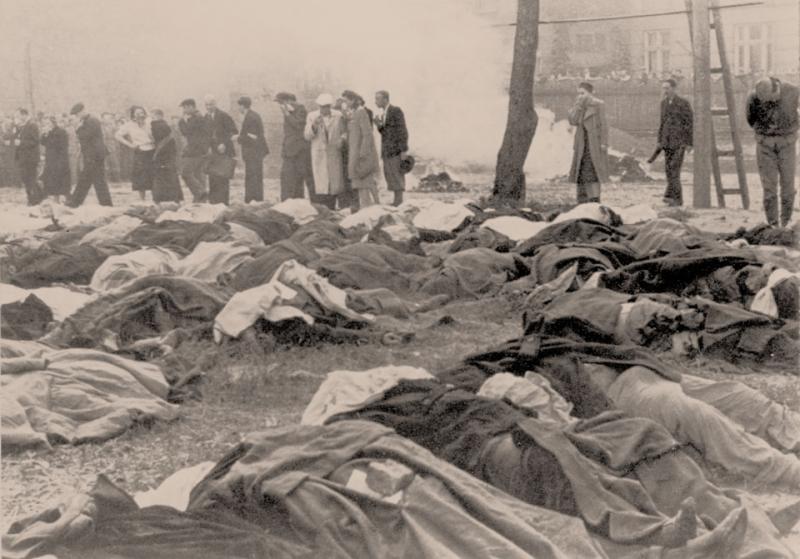In the European Union the first intergovernmental standard governing archival policies and practices was passed fifteen years ago. Ukraine is also moving towards standardizing policies on archival materials of former regimes. On 9 April 2015, the Ukrainian Parliament enacted the bill №2540 "On access to the files of the repressive authorities of the Communist totalitarian regime of 1917-1991."
Under the new law, all the archives of the Soviet repressive organs will be open and modern security forces will lose connection with them. According to the European principle which is being established, the law could restrict access to information but not to the document. The archivist will not bear responsibility for the dissemination of information, but the person who made it public. All the documents of the repressive authorities of the Communist totalitarian regime of 1917-1991 in Ukraine should be transferred to the State Branch Archive of the Ukrainian Institute of National Remembrance (SBA UINR).
Similar archives exist in Germany, Romania, Hungary, Lithuania, Latvia, Estonia, and other countries. We will focus on three examples - the Czech Republic, Slovakia, and Poland.
Two state agencies were established in the Czech Republic on June 8, 2007 – the Institute for the Study of Totalitarian Regimes and the Archive of Security. The second one gained a special status in the network of public state archives.
Since 1 February 2008 the Archive took responsibility for archives and documents provided by the Ministry of the Interior, Ministry of Defence (including military intelligence), Ministry of Justice, Office of External Relations and Communications and Information Security Service. Questions of attracting material and immaterial resources, recruiting, transferring archival materials and organizing information systems were solved in only six months.
Due to the total inventorying materials of separate collections are gradually revised and refined, so after its completion the final number of archival collections and their precise amount will be known.
In Slovakia, the Institute of National Remembrance was established in 2002 under the law "On access to the files relating to the activities of national security services in 1939-1989..." The Institute's Archival Unit was founded in July 2003 and received documents from intelligence services and law enforcement agencies in 2005.
In Poland, the process of gathering documents began in 2000. A 60-day time limit was determined by the law which provides for the transfer of documents, however due to the large array of materials the process took a little longer. The active phase of this process continued until 2003, although new materials continue to come to the archives division of the Institute of National Remembrance even nowadays. Over 90 thousand meters of materials have been compiled by the end of 2012. One-third are materials of Bureau of disclosure and archiving of documents (BUiAD) in Warsaw, two-thirds – materials of the District Bureau of disclosure and archiving of documents (OBUiAD) and local bureaus.
Thus, the Verkhovna Rada of Ukraine adopted a law based on successful European practices. However, news about opening access to the archives of the Soviet era spawned a series of myths and unfounded fears. We will try to answer the most common ones.
Will the State Branch Archives of the Security Service of Ukraine, of Ministry of Internal Affairs and the Archives of the Foreign Intelligence Service disappear?
No, they will not. According to the law only historical documents of the Soviet totalitarian regime will be transferred from modern intelligence services and law enforcement agencies to the State Branch Archives. Independence period archives (1991) remain in the intelligence services and law enforcement agencies and they will keep getting new materials.
Will the documents from the regional and central state archives be taken to Kyiv? Will there be an opportunity to explore materials in the regions?
Materials from the archives of the SSU, the Ministry of Internal Affairs, Foreign Intelligence Service and relatively small funds from the archives of the Ministry of Defense, Ministry of Justice, the procuracy authorities, Penitentiary and Frontier Services and judicial administration will be transferred to the SBA UINR.Transfer of files from regional and central state archives is not provided by law. Documents of the repressive Soviet period authorities remain there, but the law will simplify access to that documents. Regional archives of temporary storage of documents located in the regional SSU, Ministry of Internal Affairs and Foreign Intelligence Service will be transferred to UINR.
Issues of location of SBA UINR's regional branches are processed at the Cabinet of Ministers. The success of this model confirms Polish experience: for example, the Bureau of access and archiving documents in Warsaw - archival department of the Institute of National Remembrance, which, together with eleven regional offices is a part of the departments of the INR. Regional Bureaus are located in Bialystok, Gdansk, Katowice, Krakow, Lublin, Lodz, Poznan, Rzeszow, Szczecin, Warsaw and Wroclaw. Archival units also include four local offices, which have their own archives, and are in Bydgoszcz, Kielce, Olsztyn and Radom.
Is it possible to transfer to the main archive only electronic copies and leave the originals in their current locations?
It is important to ensure public access to original documents. The philosophy of law is that they should not be kept in the archives` data rooms of modern intelligence services and the Ministry of Internal Affairs, which have no function to investigate the past. The law provides for the creation of digital copies, but the quantity of materials is extremely large. These are years of work and it will be done. For the day, transfer and digitization have to be parallel processes.
Will it be necessary to close access to the archives for the transfer of funds?
The European experience shows that there is no need in closing archives that would stop work of researchers and consideration of socio-legal appeals. The Czech Republic has spend more than half a year to transfer more than 16 thousand meters of archive shelves without closing the access to them.
Can the transportation of archives cause discrepancy of cases with scientific reference system?
The law provides for the transfer of archives together with the scientific reference system: textbooks and thematic files, magazines, catalogs, etc. However, the archival retrieval project "Ukrainian martyrology of the twentieth century", which introduces to the nationwide database information about individuals who were convicted by Soviet intelligence services has been carried in the archives for several years, and during the transfer it will become an additional reference system.
Will the information about Soviet secret service agents remain classified?
No. Article 8 of the Law of Ukraine "On State Secrets" refers to the state secret information of personnel; tools, content, plans involving cooperation on a confidential basis by operational-investigative authorities. The list of such authorities is determined by the Law of Ukraine "On operational-investigative activity." There is no Cheka, NKVD, NKHB, MGB, KGB and similar repression groups of the Soviet period in the law. So it is unlawful and unacceptable to classify documents of the Soviet security services.
"Knowledge of the past is one of the human’s cultural rights. Historical sources allow us to form a more objective view of the past, and thus help us to better understand present and to make justified decisions in the future. Thanks to this it will be more difficult to manipulate history and use unreasonable prejudice to provoke hatred between peoples," - said Terry Davis. The experience of the European Union will help Ukraine solve this important problem.





